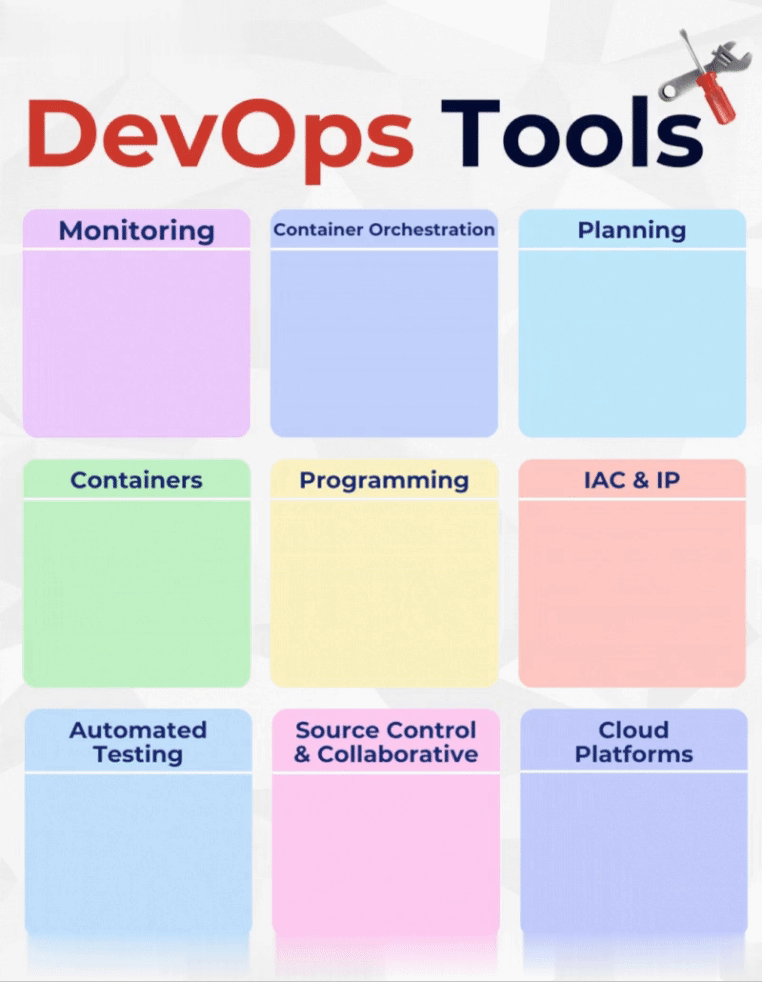Exploring DevOps Tools: A Comprehensive Guide
In the world of DevOps, having the right tools at your disposal can make all the difference in streamlining workflows, automating processes, and ensuring efficient development and operations. Let’s delve into some essential categories of DevOps tools and explore the key players in each:
Automated Testing:
Selenium
Renowned for its capability in testing web applications, Selenium offers a robust suite of tools for automating web browsers across various platforms.
Appium
Dedicated to mobile application testing, Appium stands out for its cross-platform support, enabling testing of iOS, Android, and Windows apps using the same API.
Katalon
Designed with user-friendliness in mind, Katalon provides a comprehensive solution for testing web, mobile, and API applications, offering a range of built-in keywords and scripts.
JMeter
Ideal for performance and load testing, JMeter empowers teams to simulate heavy loads on servers, networks, and objects to analyze performance under different conditions.
Container Orchestration
Kubernetes
A powerhouse for managing containerized applications, Kubernetes excels in automating deployment, scaling, and operations across clusters of hosts.
Docker Swarm
Simplified yet powerful, Docker Swarm offers a straightforward approach to container orchestration, making it an attractive choice for smaller teams and simpler deployments.
Openshift
Backed by Red Hat, Openshift provides an enterprise-grade container platform built on Kubernetes, offering robust features for container orchestration and application management.
Apache Mesos
Efficiently managing resources across clusters, Apache Mesos enables the orchestration of diverse workloads, including containers, VMs, and bare metal.
Monitoring
Kibana
Part of the Elastic Stack, Kibana facilitates real-time visualization and analysis of logs, enabling teams to gain insights into system behavior and troubleshoot issues effectively.
Nagios
A stalwart in the monitoring space, Nagios offers a comprehensive monitoring solution for IT infrastructure, enabling proactive identification of problems and swift resolution.
Prometheus
Designed for dynamic environments, Prometheus specializes in monitoring metrics and generating alerts, empowering teams to maintain the health and performance of their systems.
Splunk
With its powerful analytics capabilities, Splunk excels in analyzing and monitoring machine-generated data, providing valuable insights for troubleshooting and optimization.
Planning
Jira
A cornerstone for project management and agile development, Jira offers robust features for planning, tracking, and releasing software iterations, fostering collaboration and transparency.
Facilitating real-time communication and collaboration, Slack serves as a centralized hub for team discussions, file sharing, and integration with various tools and services.
Confluence
Atlassian’s collaborative workspace, Confluence, provides teams with a platform for creating, sharing, and organizing documentation, fostering knowledge sharing and collaboration.
Programming
Renowned for its versatility, Python is a go-to language for automation, scripting, web development, and data analysis, making it a favorite among DevOps practitioners.
Go
Noted for its efficiency and simplicity, Go (or Golang) is well-suited for building scalable and performant systems, making it an increasingly popular choice in the DevOps community.
Groovy
With its dynamic nature and seamless integration with Jenkins pipelines, Groovy is a preferred language for scripting automation tasks in the CI/CD process.
Bash
As the default shell in Unix environments, Bash is indispensable for automating tasks, writing scripts, and orchestrating complex workflows in DevOps pipelines.
Stay tuned for the continuation of this comprehensive guide as we explore more categories and essential tools in the realm of DevOps!
Keep visiting QuickShare and write to us in the comments below.

